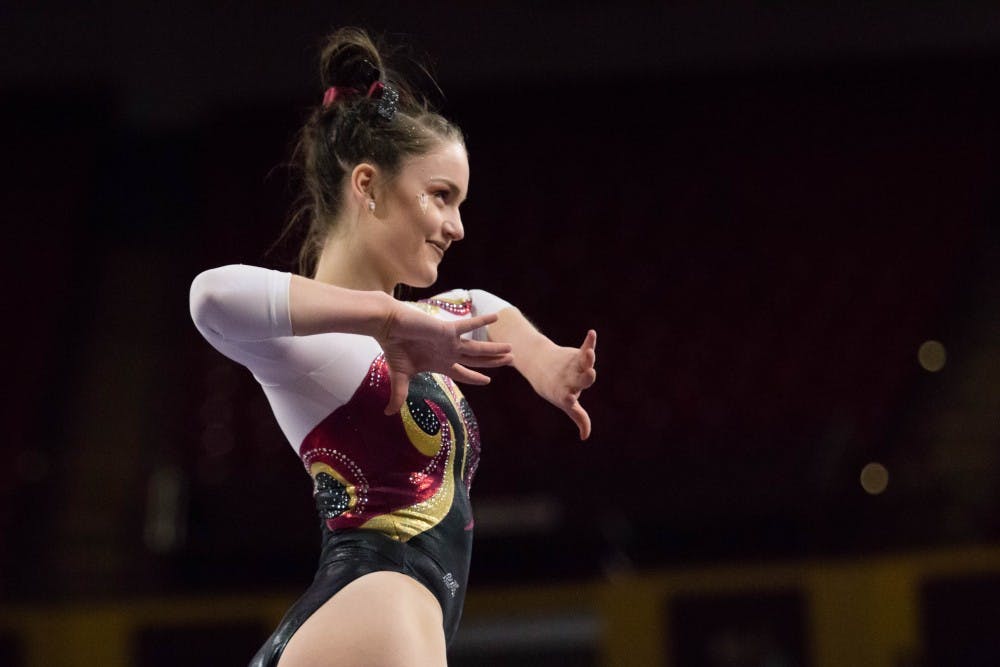Gymnastics is a sport where specialization is key to an athlete's development. Some people say that early specialization in athletics can interfere with the development of social skills and possibly burn out the athletes. Others believe that it can lead to early success among athletes and is actually beneficial in some sports.
Youth is an important factor in gymnastics, and while many ASU gymnasts believe there are two pivotal moments in every gymnast's career, one of those often occurs before they reach full maturation. This leaves little room for young gymnasts to be involved in other sports.
For many athletes, competing in multiple sports is common. Plenty of high school quarterbacks pitch for their baseball teams during the off-season, and lots of linemen wrestle. Even on the pro circuit, Bo Jackson played in the NFL and MLB, as did Deion Sanders.
But gymnastics is different. Many gymnasts start young and are expected to stick with it exclusively as long as they are competing.
Sophomore Ashley Szafranski said focusing solely on gymnastics worked best for her.
“I would say gymnastics previously in club took up so much time,” Szafranski said. “It was all gymnastics and school ... I spent more time in the gym than at home.”
An argument for not specializing in one specific sport is that young athletes may grow tired of the sport they’re participating in or quit before recognizing their potential. Junior Anne Kuhm said that she doesn’t think specialization is a bad thing as long as the person enjoys their sport.
“You can be focused on whatever you want to do, and you can set goals and try to achieve them,” Kuhm said.
Trying to balance sports and academics can be difficult, and many times, participating in another sport is not feasible for young athletes, as Szafranski noted.
“I think that if I was participating in something else, I just wouldn't have enough time for all that, so I think focusing on gymnastics and school was best for me personally,” Szafranski said.
Junior Justine Callis attributes her success to the opposite. The gymnast was a competitive dancer as well as a gymnast through elementary and middle school before having to choose between the two at the start of her freshman year of high school. Callis said she believes that choosing not to specialize allowed her to compete on a different level.
“They both actually helped each other so much. If it weren't for my background dancing, then my performance level wouldn't be nearly the same,” Callis said.
Spending years doing both sports required some intense discipline. Callis said there were many days where she’d go in at 6 a.m. to train for gymnastics and leave at 9 p.m. after dance practice. She said that while participating in both sports left her with a packed schedule, she enjoyed it because of the different perspectives she acquired.
“I got the experience of both of them and kind of got to get my focus off of gymnastics just enough to experience some other parts of the world,” Callis said. “But then my gymnastics helped my dance so much, so I did both of them at the same time.”
When Callis had to choose, she went went with gymnastics.
“It got to the point where I was forced to pick one. I couldn't do both anymore because I was just traveling,” Callis said. “I would be traveling for dance and gymnastics on the same weekend, so it was insane but it was worth it. It was a grind, but it definitely helped so much and I wouldn't do it differently.”
Callis said that she thinks that being involved in multiple athletic activities at a young age can be healthy because of the alternative perspectives it gives the athletes. She said that when done properly, being involved in multiple activities makes for a more well-rounded athlete.
“I think it's healthy to have a different focus because sometimes you can get obsessed with gymnastics, and I was obsessed with gymnastics in a good way,” Callis said. “But it's really easy to be obsessed with it in a bad way, because you're over-training, and you can't focus on anything outside of gymnastics as far as life goes.”
Specialization is a technique that has both positive and negative attributes, but for Callis, choosing to not specialize is something she would never take back.
"If I could go back, I’d do the same thing,” Callis said. “I think that the experiences I took from both of them and the relationships I got from both of them just honestly helped me so much in the long run.”
Reach the reporter at klbroder@asu.edu or follow @KellyBSays on Twitter.
Like State Press Sports on Facebook and follow @statepresssport on Twitter.




